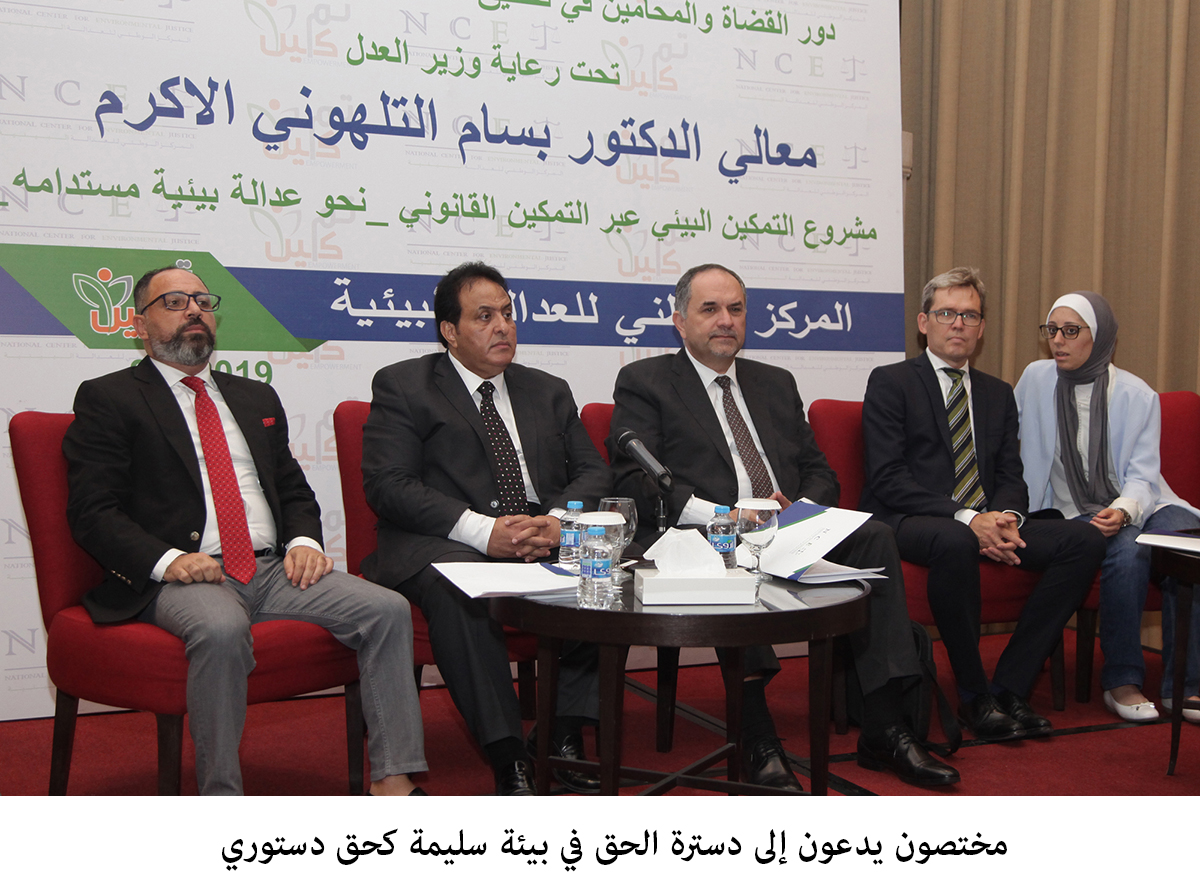
Environmental Empowerment through Legal Empowerment Project with GIZ
The National Center for Environmental Justice (NCEJ) has completed the project “Environmental Empowerment through Legal Empowerment”, funded by the German International Cooperation Agency (GIZ).
The National Center for Environmental Justice (NCEJ) has completed the project “Environmental Empowerment through Legal Empowerment”, funded by the German International Cooperation Agency (GIZ).
Project workshops:
– “The Role of Youth and Society in Promoting Active Environmental Citizenship”
- The first session included the theme “Environmental Citizenship between Concept and Application”. This session was devoted to talking about the concept of environmental citizenship as a concept of value and a social dimension that embodies the affiliation reinforced by individual and collective initiatives in supporting and protecting the environment to build productive human behaviour to promote sustainable development goals.
Explaining the importance of sound environmental rights as one of the basic human rights that have been recognized by the international community, and explaining the role of local community institutions in promoting these values and rights.
- The second session included the theme of “Environmental Legislation, Importance and Methods of Enforcement”, and this session was devoted to a presentation of the most prominent legislation and laws regulating the protection of the environment in Jordan, the Aqaba Economic Zone and ways to enforce them, and the extent of compatibility and conflict between them, and how to push towards environmental litigation, based on the reality of litigation in Jordan.
– “The Role of the Private Sector in Protecting the Environment and Supporting Sustainable Development Plans, Social Responsibility and Its Impact on Environmental Development”
- The first session focused on the topic “Green Economy and the Challenges of Sustainable Development”, which was devoted to talking about the dangers of increasing pressures on the environment as a result of the various commitments and activities that serve the economy through an analytical discussion and highlighting the concept of the green economy and how to achieve growth and sustainable development without violating the ecosystem, with the aim of Achieving justice and equality in development with a focus on environmental legislation and the legal framework and their compatibility with the green economy.
- The second session included a topic entitled “The Role of the Private Sector in Supporting Sustainable Environmental Development Plans (Analytical Perspective), which was devoted to talking about how to enable the private sector to take voluntary measures to support sustainable environmental development plans, and activate them within its methodological tools at the local level, through a discussion Analytical and highlighting the current measures currently taken by the private sector in Jordan towards supporting sustainable environmental development plans, presenting the approach followed by the private sector in this field, and providing suggestions to the government about some ways to motivate the private sector and companies in general to implement more of these measures by exploiting The various developmental dimensions of the operations of these companies within the focus of the question posed, (How can the private sector exploit the various mechanisms of governance and local policies to move towards voluntary measures?), which reflect the importance of environmental and economic sustainability, and its impact on local communities.
- The third session included the title “The Role of the Government Sector in Empowering the Private Sector to Take a Leading Role in the Measures of Sustainable Environmental Development Plans”, which was devoted to discussing the current political pledges by Jordanian governments to support the private sector to carry out its societal responsibilities towards protecting the environment, with the capabilities and expertise that the private sector possesses. It allows him to view additional contributions in bridging the significant social gaps in supporting sustainable development plans and financing their projects that are capable of adapting to climate change, and highlighting the measures taken by the government in order to strengthen the role of the private sector to raise the level of voluntary private sector participation in integrating the dimensions of environmental development within its programs Economic.
Universities
The “Environmental Empowerment Through Legal Empowerment Project” included the “Art of Debate and Advocacy from the Perspective of Environmental Law”, which targeted 180 students from the faculties of law and law in six Jordanian universities (Al-Hussein Bin Talal University, Yarmouk University, Middle East University, Petra University, Zarqa University and University of family of the house).
The course included specialized training for each university in the art of debate and advocacy, and its projection on environmental law and environmental justice.
This event is considered the first of its kind at the level of the country and universities that launches the idea of the art of debates and gaining support from the perspective of environmental law among students of faculties of law and law in public and private universities in the Hashemite Kingdom of Jordan.
This training was chosen based on studies and a previous scientific survey, and consultations of experts and academics on the concept of environmental rights and the teaching of environmental law at law faculties in Jordanian universities, the results of which showed a lack of public awareness, and a lack of interest among students, teaching staff, and decision-makers regarding the importance of dedicating the concept of Environmental rights among university students and teaching environmental law as an optional or compulsory requirement for law faculties at the short level and as a compulsory subject for humanities faculties in the long term.


